Rākhī derives from the Sanskrit rakṣikā, a join: rakṣā protection.
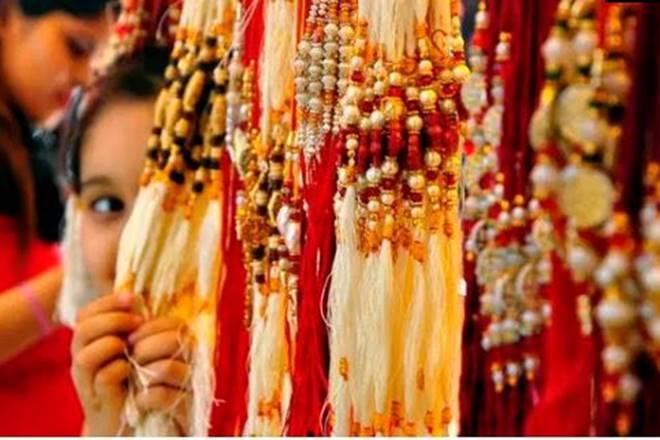
On this day, sisters of all ages tie a talisman, or amulet, called the rakhi, around the wrists of their brothers, symbolically protecting them, receiving a gift in return, and traditionally investing the brothers with a share of the responsibility of their potential care.
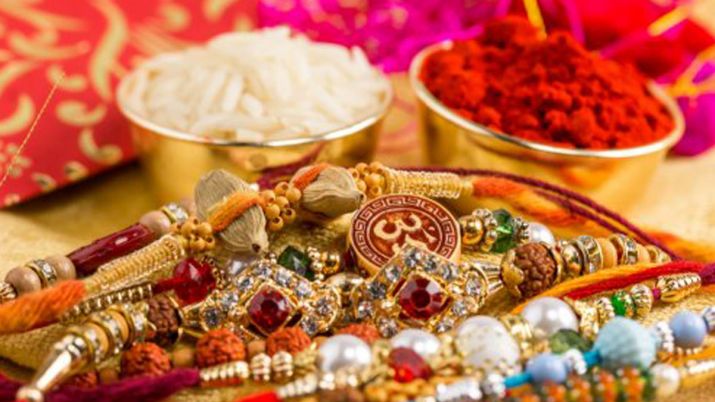
Raksha Bandhan is observed on the last day of the Hindu lunar calendar month of Shraavana, which typically falls in August. The expression “Raksha Bandhan,” Sanskrit, literally, “the bond of protection, obligation, or care,” is now principally applied to this ritual. Until the mid-20th-century, the expression was more commonly applied to a similar ritual, also held on the same day, with precedence in ancient Hindu texts, in which a domestic priest ties amulets, charms, or threads on the wrists of his patrons, or changes their sacred thread, and receives gifts of money; in some places, this is still the case.
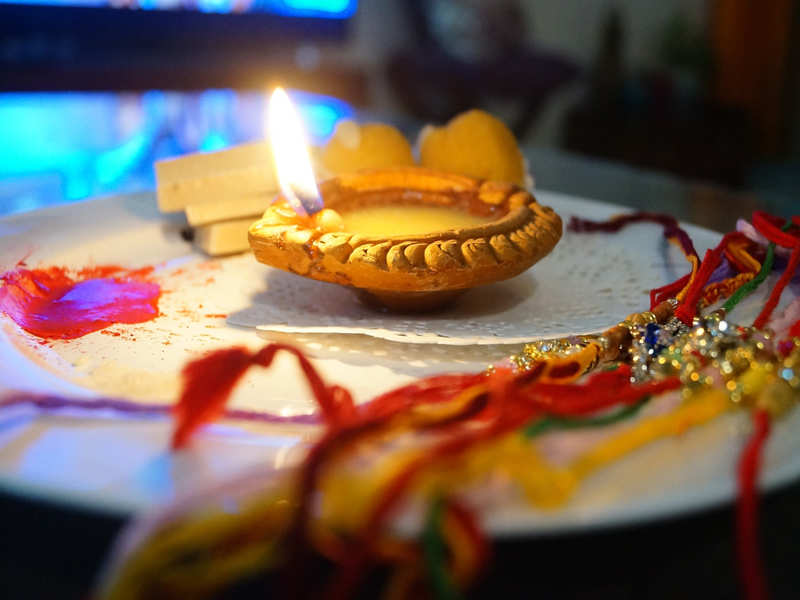
The sister-brother festival, with origins in folk culture, had names which varied with location, with some rendered as Saluno, Silono,and Rakri. A ritual associated with Saluno included the sisters placing shoots of barley behind the ears of their brothers.
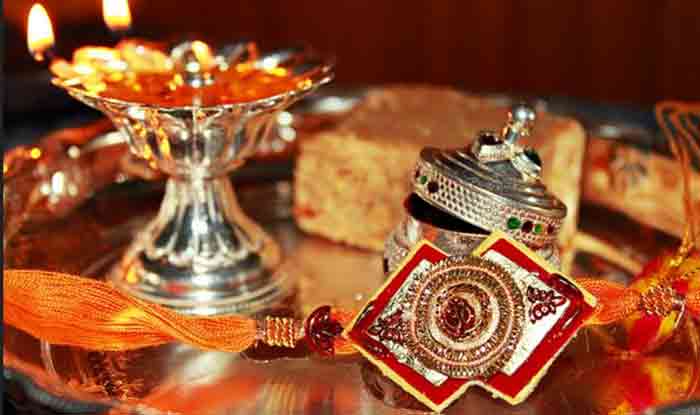
Important in the Great Tradition is chapter 137 of the Uttara Parva of the Bhavishya Purana, in which Lord Krishna describes to Yudhishthira the ritual of having a raksha (protection) tied to his right wrist by the royal priest (the rajpurohit) on the purnima (full moon day) of the Hindu lunar calendar month of Shravana). In the crucial passage, Lord Krishna says,
“Parth (applied to any of the three sons of Kunti (also, Pritha), in particular, Yudhishthira): When the sky is covered with clouds, and the earth dark with new, tender, grass, in that very Shravana month’s full moon day, at the time of sunrise, according to remembered convention, a Brahmin should take a bath with perfectly pure water. He should also according to his ability, offer libations of water to the gods, to the paternal ancestors, as prescribed by the Vedas for the task required to be accomplished before the study of the Vedas, to the sages, and as directed by the gods carry out and bring to a satisfactory conclusion the shradh ceremony to honor the deceased.
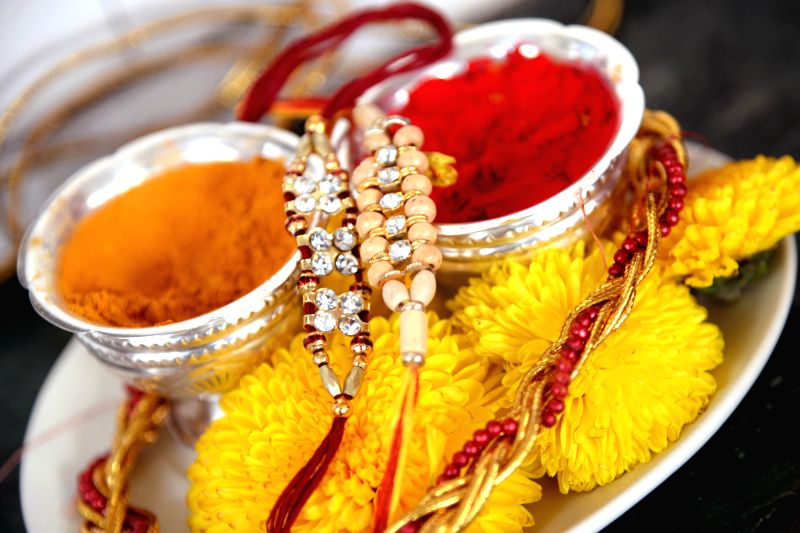
It is commended that a Shudra should also make a charitable offering, and take a bath accompanied by the mantras. That very day, in the early afternoon (between noon and 3 PM) it is commended that a small parcel (bundle or packet) be prepared from a new cotton or silk cloth and adorned with whole grains of rice or barley, small mustard seeds, and red ocher powder, and made exceedingly wondrous, be placed in a suitable dish or receptacle. … the purohit should bind this packet on the king’s wrist with the words,’I am binding raksha (protection) to you with the same true words with which I bound Mahabali King of the Asuras. Always stay firm in resolve.’ In the same manner as the king, after offering prayers to the Brahmins, the Brahmins, Kshatriyas, Vaishyas and Shudras should conclude their Raksha Bandhan ceremony.”
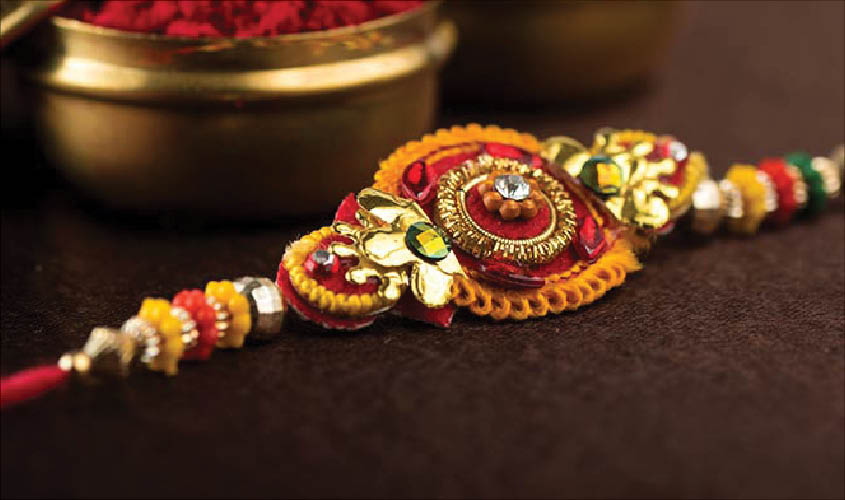
In urban India, where families are increasingly nuclear, and marriages not always traditional, the festival has become more symbolic, but continues to be highly popular. The rituals associated with these rites, however, have spread beyond their traditional regions and have been transformed through technology and migration. According to anthropologist, Leo Coleman:
In modern rakhi, technologically mediated and performed with manufactured charms, migrating men are the medium by which the village women interact, vertically, with the cosmopolitan center—the site of radio broadcasts, and the source of technological goods and national solidarity.
Hindi movies have played a salient role. According to author Vaijayanti Pandit,
Raksha Bandhan traditionally celebrated in North India has acquired greater importance due to Hindi films. Lightweight and decorative rakhis, which are easy to post, are needed in large quantities by the market to cater to brothers and sisters living in different parts of the country or abroad.
More social interaction among India’s population has played a role in the increased celebration of this festival. According to author Renuka Khandekar:
But since independence and the gradual opening up of Indian society, Raksha Bandhan as celebrated in North India has won the affection of many South Indian families. For this festival has the peculiar charm of renewing sibling bonds.
रक्षाबंधन की आपको बहुत बहुत शुभकामनाएँ!

Pingback: Rakshabandhan – रक्षाबंधन | SPEAKZEASY